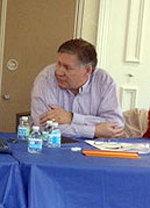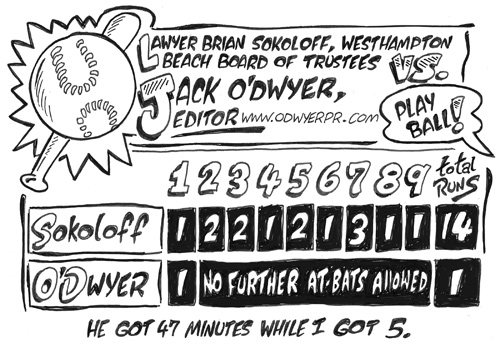|
|
The Westhampton board doesn’t hold press conferences but it can’t escape reporters during the “Public” part of monthly meeting. One issue tonight is last week’s appointment of Tom Moore, husband of Mayor Maria Moore, as library president.
Critics say this is further proof of the Village’s domination of the supposedly independent library. Three WHB trustees, Joan Levan, Hank Tucker and Marie Moore, were on the five-member library board in 2010.
Tom Moore strongly denied there is any “conflict of interest” when accused of that at the Oct. 30 library board meeting.
Since the WHB board is so influential in library affairs, an issue is how can the board sit by when the library announces plans to spend $3.1 million on capital improvements on a $7.5M building that was opened only five years ago? The library has $4.1M in cash/savings and is considering how to spend it.
There is one notorious issue where the WHB and library boards are in sync—the proposal for an eruv Jewish religious boundary in WHB. It is the biggest fiscal threat facing the community since it carries with it the possibility of $1 million+ in legal costs if WHB loses the fight against it in court.
Policy of both the WHB and library boards is that the less said about the issue, the better. The WHB board finally allowed discussion of it on Sept. 3 after citizens complained of a “blackout” and demanded to know the status of the legal actions.
WHB’s Side Got 55 Minutes
WHB outside counsel Brian Sokoloff described the litigation for 35 minutes and took questions for another 20 minutes. He mentioned court decisions that support eruvim but not the 23,424-word decision of Judge Wiliam Bassler on the Tenafly eruv dated Aug. 10, 2001 that ordered an eruv taken down.
Sokoloff referred to the 34-page paper of UCLA Law Prof. Alexandra Susman in which she attacks claims that eruvim are protected by the Constitution.
He said Susman is entitled to her opinion but the court’s opinion is the one that counts. Court opinions favoring eruvim ignore the fact that they are visible on websites of Synagogues and Google. The opinions repeatedly refer to the “invisibility” of eruvim markers to passersby but ignore their high visibility on the web where they are accompanied by explanations.
Given the opportunity, this reporter could take the pro-eruvim decisions apart limb by limb, relying partly on points made by Prof. Susman and Prof. Marci Hamilton of Yeshiva University, who wrote an 18-page paper for WHB in 2008.
|
Cartoon: Mel Toff |
Request to be on Agenda Denied
Laypeople are needed to dismantle the court decisions, pointing out the errors and omissions in them. Lawyers are not going to do this since criticizing courts could end their careers as lawyers. Sokoloff did not speak one word of criticism of the court decisions.
This reporter will be at the meeting tonight but has been denied a position on the agenda. That means we can’t speak more than five minutes and if we look at the audience or the camera doing a videotape a WHB lawyer will demand we “Address the board!” “Address the board!”
Allowing Sokoloff 55 minutes to present WHB’s version of the eruv issue while only allowing this reporter five minutes was like a baseball game where one side gets nine innings to score and the other side gets one inning.
This would be our fifth appearance during the public comment section of the meetings. We talked for ten minutes for the first two sessions but then were limited to five minutes in the Sept. 3 and Oct. 8 meetings.
The O’Dwyer Co. has compiled nearly 1,000 pages of legal and other documents on the eruv situation and our website pulls up about 200 entries when the word “eruv” is entered in the search box. We could perform an educational role in this matter that WHB and the library have not.
Sokoloff mentioned the Aug. 25 decision of the Southampton Council to allow an eruv as long as SH escapes fines and legal costs.
However, he did not point out the undemocratic way in which the Council made that decision. It came as the next to last item of the meeting and was a “walk-on” proposal not on the agenda. It was rushed through in the last few seconds with no discussion by Council members or the public. Jewish People for the Betterment of WHB called the action “shameful” in a letter to the Southampton Press.
WHB Website Sketchy on Eruv
We will also point out that the WHB website, while it has nearly 100 links to legal documents, does not list such key items as the Susman or Hamilton papers. WHB paid Prof. Hamilton to write that paper in 2008. Missing is the 6,000-word discussion of the eruv situation before Justice Kathleen Tomlinson Feb. 24, 2015.
The library’s policy of ignoring the eruv challenge mirrors the policy of the WHB trustees in ignoring the situation until the Sokoloff talk Sept. 3.
The library emphasizes its services to children and teenagers but what they are learning is to avoid public discussion of controversial topics, conform, and don’t challenge authorities including those at the library or school.
The eruv issue has been around since 2008 when the Hampton Synagogue first proposed it and hosted a meeting for more than 200 citizens Aug. 13, 2008.
A comprehensive exhibit and series of talks by representatives of both sides should have been initiated by the library to explain the complexities of eruvim and how courts have handled challenges to them.
Instead, there has been avoidance of the subject, mirroring the policy of the WHB board. An elected library board, free from influence of the WHB board, could change that policy. A good start would be inviting Prof. Hamilton to speak as well as representatives of the East End Eruv Assn.




 Husch Blackwell Strategies has added FleishmanHillard alum Michael Slatin as a principal in its public affairs group.
Husch Blackwell Strategies has added FleishmanHillard alum Michael Slatin as a principal in its public affairs group. Rory Cooper, a veteran Republican operative and policy specialist, has joined Teneo’s Washington office as senior managing director in its strategy & communications practice.
Rory Cooper, a veteran Republican operative and policy specialist, has joined Teneo’s Washington office as senior managing director in its strategy & communications practice. Brian Fallon, who served as national press secretary for Hillary Clinton’s 2016 presidential run, is signing on next month as Vice President’s Kamala Harris’ campaign communications director.
Brian Fallon, who served as national press secretary for Hillary Clinton’s 2016 presidential run, is signing on next month as Vice President’s Kamala Harris’ campaign communications director. TikTok is nothing more than a Chinese propaganda tool that poses “a grave threat to America’s national security and, in particular, impressionable children and young adults,” say two Congressmen who want the platform registered as a foreign agent.
TikTok is nothing more than a Chinese propaganda tool that poses “a grave threat to America’s national security and, in particular, impressionable children and young adults,” say two Congressmen who want the platform registered as a foreign agent. Public Strategies Washington has added Abbie Sorrendino, a former aide to now Senate Majority Leader Chuck Schumer.
Public Strategies Washington has added Abbie Sorrendino, a former aide to now Senate Majority Leader Chuck Schumer.


 Have a comment? Send it to
Have a comment? Send it to 
No comments have been submitted for this story yet.